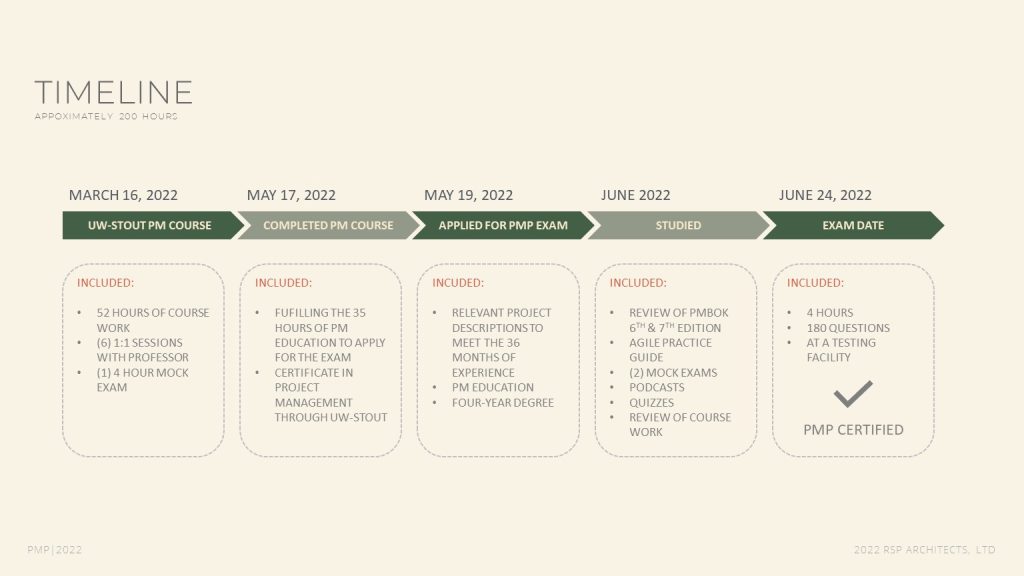How Good Project Managers Become Great

It’s not all schedules and budgeting. The best project managers need high emotional intelligence and leadership skills to excel. RSP’s Lorrie Albers PMP explains how she identified and reinforced her approach to project management through her professional experience and recent PMP certification.
As Charles Eames said, “the details are not the details. They make the design.” And, while the creative process settles on the design and the details, project managers are the ones that make those details fall into place. They are the professionals who think holistically about a project from concept to the final punch list and beyond, keeping everyone on time and on budget. In long and short, from start to finish, PMs who can get all of that done and keep a team of designers, engineers, contractors, vendors, and the client happy create cohesiveness and reduce stress for everyone on the team.
A great project manager does not just appear one day, rising out of a pile of contracts and Gantt charts—they combine natural ability with experience, education, and emotional intelligence skills to lead diverse teams of people. Yes, it takes organization and a certain sensibility, but as I have learned in my career and through recently completing my Project Management Professional (PMP) certification, it’s the often-overlooked “soft skills” that make for a truly great project manager.
Project Management and Emotional Intelligence
In my experience, a lot of people just “fall into” project management. Employees get to a certain point in their careers, and they realize they want to move to the next step. They have the years of experience to understand the inner workings of a project. They have the skills and understanding to oversee project budget, scope, and schedule, and they start leaning into the organizational aspects of a project over the creative side. But they do not necessarily have the specific training to lead a team without official authority. For me, I wanted to learn more about best practices, best processes and what makes a leader into a great leader. That is why I decided to pursue my PMP certification.
One of the most important things I learned is that leading a project team does not mean having authority over the team. The meaning of “leading without authority” is that project teams are not a project manager’s direct reports. A PM does not control the team’s core job responsibilities or what other projects they may be working on. And you certainly cannot control someone’s personal life, which is often a huge contributing factor to stress.
As a PM, you are managing your client and team all while being able to anticipate the potential for stress and other risks. You have to find different ways to motivate people and keep them engaged. And you have to have the kind of emotional intelligence that lets you read a room, read people’s mannerisms and emotions, and figure out how to motivate them. All while building up your team, create an environment that fosters collaboration, and have conversations instead of just being a task master.
A Project Manager’s “Soft Skills” are a Crucial Tool
These interpersonal skills are often referred to as “soft skills” that can go unrecognized in some industries. But, truly, these “soft skills” can be the reason for a project’s success. They give project managers the tools to get everyone on a team working together, to give everyone clear direction, and make sure everyone knows what to expect and the expectations for success. They help organizations mitigate risk. All while they work to get the most out of people by elevating them to new levels of productivity and quality. When that happens, scope, schedule and budget become far easier to manage and ultimately set the project up for success.
If you need further evidence that “soft skills,” are under rated, a poll from Gallup found that only 7% of employees say that communication at their organization is accurate, timely and open. Others say that poor communication would lead them to look for new opportunities. Clearly, the health of a project team and an entire organization genuinely hinges on the quality of these overlooked skills.
Technical Skills + Emotional Intelligence Are Greater Than the Sum of Their Parts
All of these “soft skills” may sound obvious for anyone who has worked on a team—from a middle school science project to delivering a complex new building—but working through my PMP certification drove it home. We learned strategies for more open communication with our clients and project teams. We learned how to identify more risks before they become issues. And we learned new approaches for cultivating trust on our teams and with our clients, building on what we all were already doing instinctively.
At the same time, the PMP certification process is not just about building leadership abilities; there is also a large amount of technical knowledge involved. It is a robust certification— my experience involved completing 52 course hours, six one-on-one meetings with my professor, and a four-hour mock exam. From there I went on to apply for the PMP exam by providing relevant project examples that proved I had at least three years of professional experience in addition to my course work. This is not a certification that anyone can or should take lightly, but it can give project managers the tangible skills they need to go from good to great.

Agile Principles for Project Managers
On the more technical side, part of the curriculum focuses on agile principles. Originally created for software teams, these principles can be adapted to any field. It is a way of pulling inefficiency out of any system and empowering individuals and teams to reach the best possible design solutions. Most of my projects are for corporate workplace clients with large real estate portfolios. Our projects tend to be very fast and very lean, so learning agile principles are invaluable to that process. Since getting my PMP certification, I have been able to apply these new skills to identify more risks earlier in the project process, become more resilient to change, and overseeing my teams with better trust and communication.
Project Management Leadership
One of the quotes that resonated with me from this experience is, “You lead a team by standing behind them.” That is not necessarily the first thought most people have when it comes to being a strong leader, but in my experience with strong, supportive, and accomplished leaders that have heavily influenced me, they show that quality and it encapsulates true leadership.
Through the PMP certification process and my professional experience, I have come to deeply appreciate leaders who turn tasks into a dialogue. Leaders who make the best possible decisions for human and environment resources. And leaders who hold themselves to the same standards as the rest of the team. It is the kind of project manager I aspire to be so I can empower my team to best represent RSP and give our clients the results they need.
Featured Image: UNFI Valley View | Photo by VONELINDE

